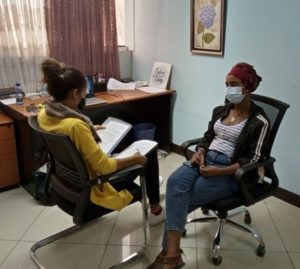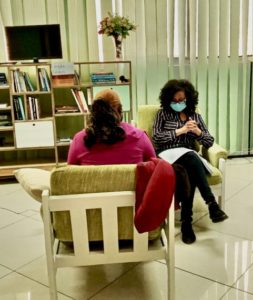
Ethiopia – Virtual EMDR Basic Training Challenges and Successes
After nearly two years of planning and preparation, the hard work of the “Ethiopian EMDR Organizing Committee,” with the administrative and financial support of Trauma Recovery/HAP, resulted in a group of 26 Ethiopian therapists completing EMDR Part-1 Basic Training. The training was conducted virtually, with an international training team, however most of the Ethiopian participants gathered in-person due to technology and internet limitations.
“It’s been quite an amazing experience to get this done and I’m really excited that we did,” shared Dorothy Ashman, M.A., a Psychologist and EMDR Facilitator who has organized EMDR training initiatives in Addis Ababa, Ethiopia since 2009.
The training was scheduled to be held on four Sundays, with the additional day added in anticipation of technology, internet, and language challenges.
The training team consisted of Dr. Dani Kahn, Trainer, and Dr. Phyllis Strauss, Facilitator, from Israel, and Dorothy Ashman, Facilitator, Joset Munro, Facilitator, and Judith Berger, Facilitator-in-Training from the US.
Challenges to Virtual Training
Despite untold challenges, the EMDR Part-1 training was successfully completed. It took 2 months to find 4 available Sundays, beginning on May 9th and finishing on June 27th, 2021. Challenges included electrical blackouts, internet and technological issues, political demonstrations, and international holidays.

While the internet in Ethiopia has dramatically improved over the past decade, it is still inconsistent and often slower than needed for a successful virtual training. Some of the therapists were able to attend virtually, but most of them gathered in person for both the morning and afternoon sessions. Originally, three large offices donated space on Sundays to provide ample room for social-distancing due to COVID and to provide stronger internet connections. However, electrical blackouts around the city and a dependence on using back-up generators, unexpectedly resulted in only one office being available for the final three days.
EMDR Therapists in Addis Save the Day
Six Ethiopian therapists, previously trained in EMDR by Dorothy and Joset, took turns being onsite each training day. They helped set up the computers for the afternoon triads, demonstrated EMDR skills to the therapists, and relayed questions to the facilitators when communication was difficult. “We could not have done it without these wonderful therapists,” stated Dorothy.
Grateful thanks go to:
- Selamawit Tesfaye, Social Worker,
- Tigist Waltenigus, Psychologist,
- Kal Admasu, Psychologist,
- Fikirte Addis, Psychologist,
- Hilina Atlabachew Taye, Social Worker,
- Alehegn Habtamu, Social Worker,
And a second thank-you goes to Fikirte Addis, also a fashion designer, who designed and sewed facemasks for everyone onsite at the trainings.
Computer technology, logistics, attendance taking, organizing snacks and beverages for breaks, and much more, were accomplished by Ethiopian therapists taking the training, a commitment that kept them working through all of their breaks.
We extend our gratitude to:
Semira Nuraddis, Psychologist Saba Feyisa, Therapist
Tewodros Dilnesaw, Therapist Ephrem Bekele, Chief Program Director, Therapist
Kalkidan Hailu, Therapist
Next Steps – Consultations, Specialty Courses and Part 2 Basic Training
Despite all the hurdles, 26 Ethiopian therapists have completed their Part-1 Basic training and are now working to complete their five hours of consultation to prepare for Part-2. Virtual consultations are being offered every Sunday by the American and Israeli facilitators, and on-site consultation is also being given from the six advanced EMDR therapists, helping them prepare to become Ethiopia’s first EMDR Consultants.

Additional recordings are being made for the therapists, to access at their convenience, including instructions on how to give and score the DES – Dissociative Experience Scale, how to use EMDR with children, and how to use the Flash Technique.
Plans are moving forward for a Virtual Part-2 EMDR Basic Training in February 2022.
Building local capacity for EMDR is the central goal of Trauma Recovery/HAP when working internationally. Our aim is no different in Ethiopia. Looking ahead to the next 5-7 years, we are determined to have EMDR trainings taught in Amharic by Ethiopian trainers and facilitators, and for the role of Trauma Recovery/HAP and the international EMDR community to transition into supporting their local training efforts.